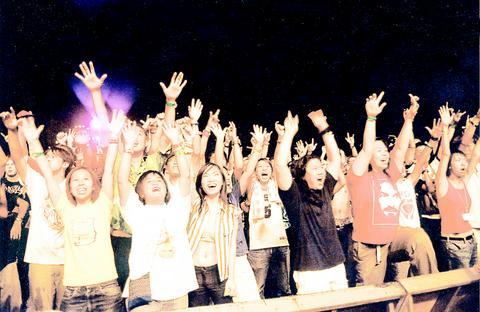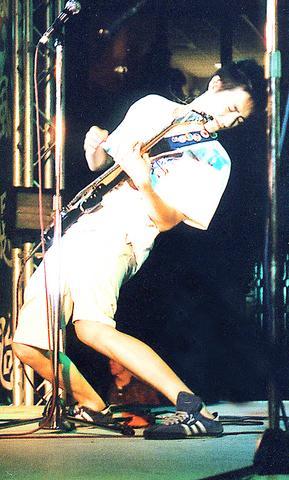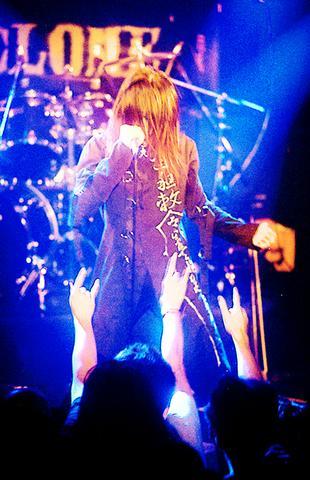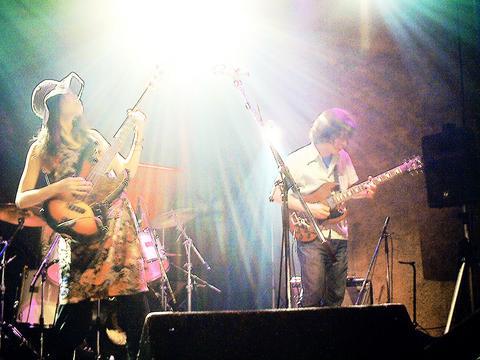To the casual observer, Taiwan must look like one rockin' island. First, Ho-Hai-Yan warmed a crowd of tens of thousands with a free concert at Fulong Beach and now revelers are priming themselves for the second three-day rock festival in as many weeks with Formoz 2003 (野台開唱).
Its name in Chinese translates as something like "wild stage concert" and comes from the performances in front of temples, at night markets and on street corners throughout Taiwan ever since there have been temples, night markets and street corners.
Those shows are marked by their impromptu spirit and happily mix all kinds of entertainment, musical or otherwise. For Formoz, though, the name is a bit of a deceit; the concert is anything but impromptu and Taiwan Rock Alliance (TRA) has been organizing this year's festival almost since the curtain fell on last year's, garnering sponsorship from every corner of the private and government sectors.

PHOTO COURTESY TRA
That support will amount to very little, though, if Taiwan's rock fans don' t come out for a second full weekend of damaging decibels, which is a concern considering this weekend's fare isn't free. One attendee to last week's beachside battle of the bands summed up what the organizers of Formoz are likely most afraid of.
"You have to pay to go to Formoz," said Amanda Chen. "Besides, it's all really hard rock. I'm not in to it that too much."
For their part, the folks at TRA are working to rid Formoz of its reputation as a head-banger's ball ? sort of.

PHOTO COURTESY TRA
"We've invited more alternative and hip-hop acts this year," said Freddy Lin (佛來敵), the 27-year-old head of TRA and perhaps the island's highest-profile head-banger. His own band, Chthonic (閃靈 ), is one of the few local rock acts to break into the international market, having been invited to tour Japan, and Freddy himself has been organizing a yearly concert for nine years. This is the third year that that annual outing has gone under the Formoz banner.
"Ho-Hai-Yan was a lot of unproven bands. What we're doing is different; most all the bands playing Formoz are established acts. And few of them are metal bands, as in past yeard."
In fact, unlike Formoz's inaugural year, when TRA broke the bank to invite Megadeth, Biohazard and Yola Tengo, this year's line-up of overseas invitees includes far less leather and long hair, such as Japanese post-rock duo Sugar Plant, hip-hop mix masters MP Family from South Korea, and a slough of Hong Kong acts, including Mazer, Fat Job, Ling Lychee and Very Ape. About the only metal lining the list of imports comes from Singapore; Impiety, whose song list consists of cult classics like Magikonsecration Goatsodomy and Paganistic Bitchgoddess Deimpalation.

PHOTO COURTESY TRA
Japan's Exias-J is also making its sophomore appearance at Formoz. The group's name stands for Experimental Improvisers' Association of Japan. It was founded in 1999 by Kondo Hideaki and is a collective of improv Jazz musicians whose passions lie in challenging the definition of music. Their sound ranges from modern Jazz to noise.
A few of the overseas acts, such as US punk revivalists Strike Anywhere, pulled out early due to SARS concerns, while others simply decided not to come. "Emo-rock" crooner Johnny Royale, who is said to make his audiences cry with his emotive brand of rock and roll, will stay in Hong Kong.
Formoz fans aren't likely to cry over their absence as a host of local favorites are slated to take to one of the festival's four stages between Friday and Monday.

PHOTO COURTESY TRA
Tizzy Back will be making their Formoz debut after getting a boost as the winners of last year's Ho-hai-Yan battle of the bands -- as will this year's winner, Monkey Insane (潑猴), who will tilt the scales with their own brand of metal. Other metal acts making the scene, in addition to Freddy's own Chthonic, are the Japanese-influenced Seventh Symphony (第七樂章 ), Sepulchre (天使之墓), 666 and several others. So much for it not being a head-banger's ball.
Of course, with nearly 40 hours of music on four stages, there'll be something for most every musical palette.
Among the softer side of local favorites will be Backquarter (四分衛), We Save Strawberries (草莓救星), Virgin Wiky, Relax One (輕鬆玩) and the Clippers (夾子 ), who remain hugely popular in Taiwan's underground music scene despite having released only one album in eight years.
"A lot of people are excited about the reunion bands that will be playing," said TRA's Doris Yeh (葉湘怡 ), referring to Ladybug (瓢蟲), MC Hotdog and others that have reformed to play this year's Formoz after having called it quits to pursue more "legitimate" careers or because they were drafted into the army, as was the case with MC Hotdog, who will be joining up with Dog G (大支) for the first time for a reunion gig that is sure to draw a crowd.
So despite their desire to have Formoz seem like a "wild stage" of extemporaneous entertainment, Freddy and his TRA staff have accomplished quite a feat in bringing together more than 100 bands; some from other countries, some from beyond the grave.
Asked if everything is ready for the weekend, Freddy, Doris and a third staffer at TRA's office look for a moment like those three monkeys that can neither see, hear nor speak any evil.
"We're just going through last-minute checks to see what there is left to do," says Freddy.
"I haven't heard of any big problems yet," Doris says. The third staffer rolls her eyes, shakes her hear then continues typing frantically at her computer. Maybe Formoz is a little more impromptu than it seems.

April 14 to April 20 In March 1947, Sising Katadrepan urged the government to drop the “high mountain people” (高山族) designation for Indigenous Taiwanese and refer to them as “Taiwan people” (台灣族). He considered the term derogatory, arguing that it made them sound like animals. The Taiwan Provincial Government agreed to stop using the term, stating that Indigenous Taiwanese suffered all sorts of discrimination and oppression under the Japanese and were forced to live in the mountains as outsiders to society. Now, under the new regime, they would be seen as equals, thus they should be henceforth

Last week, the the National Immigration Agency (NIA) told the legislature that more than 10,000 naturalized Taiwanese citizens from the People’s Republic of China (PRC) risked having their citizenship revoked if they failed to provide proof that they had renounced their Chinese household registration within the next three months. Renunciation is required under the Act Governing Relations Between the People of the Taiwan Area and the Mainland Area (臺灣地區與大陸地區人民關係條例), as amended in 2004, though it was only a legal requirement after 2000. Prior to that, it had been only an administrative requirement since the Nationality Act (國籍法) was established in

With over 80 works on display, this is Louise Bourgeois’ first solo show in Taiwan. Visitors are invited to traverse her world of love and hate, vengeance and acceptance, trauma and reconciliation. Dominating the entrance, the nine-foot-tall Crouching Spider (2003) greets visitors. The creature looms behind the glass facade, symbolic protector and gatekeeper to the intimate journey ahead. Bourgeois, best known for her giant spider sculptures, is one of the most influential artist of the twentieth century. Blending vulnerability and defiance through themes of sexuality, trauma and identity, her work reshaped the landscape of contemporary art with fearless honesty. “People are influenced by

The remains of this Japanese-era trail designed to protect the camphor industry make for a scenic day-hike, a fascinating overnight hike or a challenging multi-day adventure Maolin District (茂林) in Kaohsiung is well known for beautiful roadside scenery, waterfalls, the annual butterfly migration and indigenous culture. A lesser known but worthwhile destination here lies along the very top of the valley: the Liugui Security Path (六龜警備道). This relic of the Japanese era once isolated the Maolin valley from the outside world but now serves to draw tourists in. The path originally ran for about 50km, but not all of this trail is still easily walkable. The nicest section for a simple day hike is the heavily trafficked southern section above Maolin and Wanshan (萬山) villages. Remains of